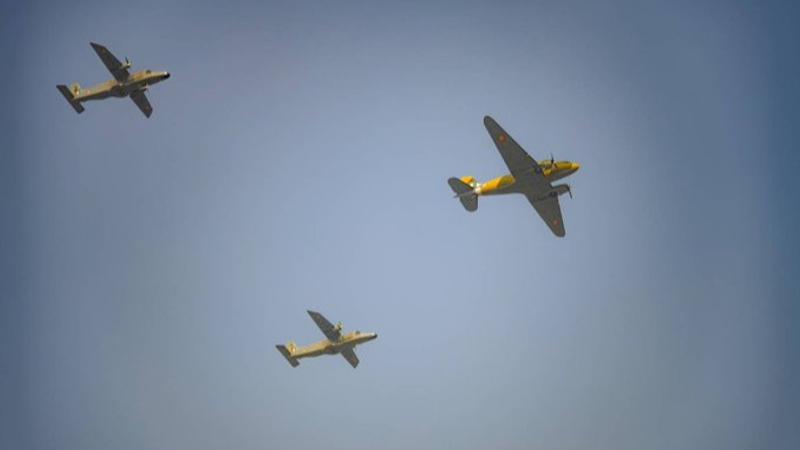Published 10:05 IST, January 25th 2024
IAF Dorniers, Along with Dakota Aircraft, to Honour 1971 Tangail Airdrop with Eco-Friendly Flypast
IAF's Republic Day flypast will feature the historic Dakota flanked by two Dornier DO-228 aircraft, flying on a blend of aviation turbine fuel and biofuel.

New Delhi: The Indian Air Force (IAF) is set to perform the historic 'Tangail formation' during the Republic Day flypast, according to IAF officials, as a nod to both military history and environmental sustainability. This formation, renowned for its role in the 1971 Indo-Pakistani War, will involve the iconic Dakota vintage aircraft flanked by two relatively modern Dornier DO-228s. What makes this year's flypast even more noteworthy is the use of a blended mixture of aviation turbine fuel and biofuel in the Dornier aircraft.
“Old and the new in the Tangail formation”, said IAF in a post on X.
1971: The Audacious Airdrop at Tangail
The Tangail formation stands as a living tribute to the historic airdrop executed on December 11, 1971, by the 2nd Battalion of the Parachute Regiment. This iconic military manoeuvre played an instrumental role in India's resounding triumph during the Indo-Pakistani War, ultimately leading to the surrender of the Pakistani Army on December 16, 1971. The Tangail airdrop, a pinnacle moment in military history, unfolded with precision and strategic brilliance.
On that historic day, a fleet of aircraft, comprising six AN-12s, 22 Dakotas, and 20 Packet aircraft, descended upon Tangail, approximately 85 km northwest of Dhaka. More than 750 highly trained personnel were parachuted into action, with the primary objective of severing the retreat path of Pakistan's 93 Infantry Brigade and obstructing their advance towards Dhaka.

Within a mere four hours, the battalion accomplished the capture of the Poongli bridge, successfully repelling the counter attacks launched by the Pakistani Army. By December 12, their strategic alliance with the Maratha Light Infantry further disrupted the plans of the 93 Brigade, propelling the 2nd Battalion to the forefront as the first Indian troops to enter Dhaka. The triumphant execution of the Tangail airdrop emerged as a pivotal factor in India's victory, underscoring the significance of parachute deployments and meticulous planning in military operations. The Republic Day celebrations, featuring a symbolic re-enactment of the Tangail airdrop, stand as a profound homage to the courage and success embodied in this daring mission.
An Eco-Friendly Homage

What sets this year's flypast apart is the IAF's use of sustainable aviation fuel (SAF) in the Dornier aircraft. The Council of Scientific and Industrial Research's (CSIR) Indian Institute of Petroleum (IIP) has produced this SAF, which is a blend of 10% hydrotreated esters and fatty acids (HEFA)-based alternative fuel mixed with regular commercial jet A1 fuel. This initiative aligns with the global goal of achieving net-zero aviation by 2050.
The IIP, based in Dehradun, proposed the use of SAF to the IAF, promoting a shift towards less carbon-emitting sources of energy. This isn't the first time the IAF has embraced eco-friendly practices; in 2019, the transport carrier AN-32 participated in the flypast using HEFA fuel. The IIP supplied the IAF with HEFA-blended SAF in different batches from 2019 to 2022, with the AN-32s and Dornier aircraft accumulating significant sortie hours on climate-friendly energy.
SAF to be Made commercial

Looking ahead, the IIP aims to commercially produce SAF, with support from the Oil and Natural Gas Corporation Limited (ONGC), which plans to set up a refinery plant dedicated to this eco-friendly fuel in Mangaluru. This initiative aligns with the government's broader goal of phasing out commercial jet A1 fuel to combat air pollution. The IIP is also seeking international certification for global sales, marking a significant step towards promoting sustainable aviation practices on a global scale.
In a parallel development, the IIP signed a Memorandum of Understanding (MoU) with Airbus to support SAF production and commercialization, addressing the decarbonization ambitions of the Indian aerospace industry. This collaboration involves joint efforts in technical assessment, approvals, market access, and sustainability accreditation for SAF production.
The move towards eco-friendly aviation is not unique to India, as military forces worldwide are exploring the use of SAF for their aircraft.
Updated 10:05 IST, January 25th 2024




